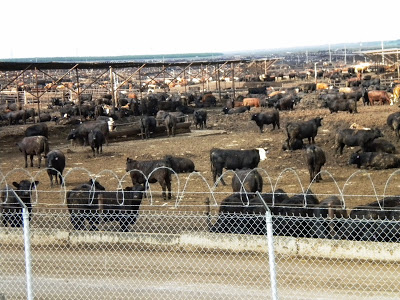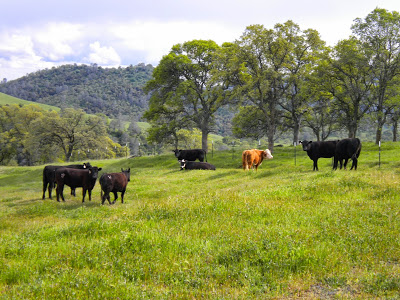| Online: | |
| Visits: | |
| Stories: |

| Story Views | |
| Now: | |
| Last Hour: | |
| Last 24 Hours: | |
| Total: | |
If you’re going to eat cattle…
The (edited) article below from today’s Los Angeles Times(May 20, 2015) is by Jared Stone, a television producer and author of Year of the Cow: How 420 Pounds of Beef Built a Better Life for One American Family(Flatiron Books, 2015). Although I am not an omnivore, presumably the vast majority of readers are omnivorous, in which case this should be of some interest.
If you’re going to eat cattle, let them eat grass.
“Stories about impending environmental apocalypse circulate almost daily, especially in drought-ravaged California. Many of these stories tend to blame agriculture — and specifically, beef — for gobbling up our resources. Though numbers vary widely and are hotly contested, some researchers estimate that it takes 1,800 gallons of water to produce each pound of beef. The real problem, however, isn’t cattle. It’s industrial feedlots, where more than 70% of U.S. cattle eventually live.
In an industrial feedlot, potentially thousands of animals are packed together in an enclosure of bare, unproductive dirt. Nothing grows there. Operators have to bring in water for the cattle to drink, and for the enormous manure ponds that contain the cattle’s waste. But the majority of the water used in raising industrial cattle goes into growing their feed. These operations are tremendously resource-intensive.
If you eat beef, grass-fed cattle are a better option. Those cattle are a healthy part of a larger ecosystem. Raised where grass grows, these cattle don’t need manure ponds. While they do need a source of drinking water, a rain-fed pond suffices in most cases. In turn, the animals’ grazing improves the health of the grassland, often dramatically, and increases the ecosystem’s water retention. These cattle, moreover, can graze on marginal land that doesn’t have any other agricultural worth. [….]
[R]ecent research suggests that properly managed grass-fed cattle can help capture and store carbon in grassland soil. In addition to making the soil more nutrient-rich and better able to hold water, one study found this process happening at a rate that could actually help offset the rise in atmospheric carbon dioxide. It also showed that properly managed cattle pastures had levels of soil organic matter comparable with those of native forests.
Of course, if there isn’t enough rain for very much grass, there isn’t enough rain for very many grass-fed cattle. That’s where we are now in California. [….]
According to the U. S. Department of Agriculture, Americans waste an estimated 30% of the food we produce. Reducing that percentage would greatly increase the efficient use of natural resources, including water. Faced with the harsh long-term realities of climate change and the immediacy of the California drought, the choice is clear: If we’re going to eat cattle, let them eat grass.
For the entire article, see here. The images were serendipitously located here.
In the same vein, but with a different farm animal, please see Barry Estabrook’s Pig Tales: An Omnivore’s Quest for Sustainable Meat (W.W. Norton & Co., 2015).
Source: http://aglaw.blogspot.com/2015/05/if-youre-going-to-eat-cattle.html





